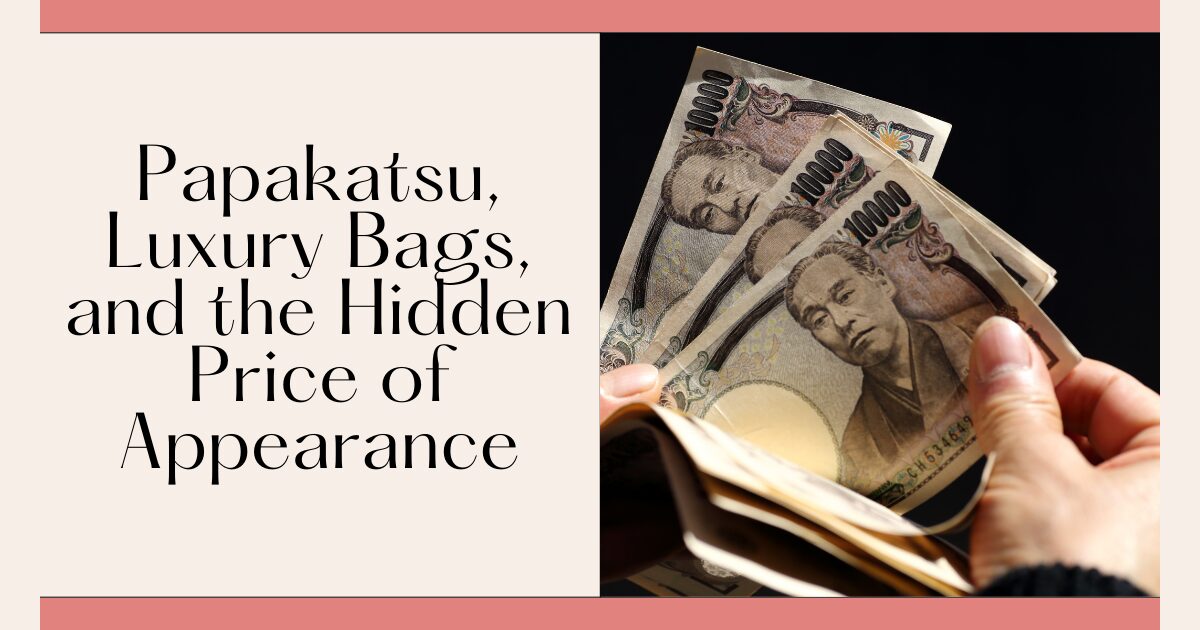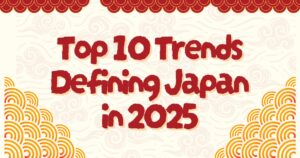Why are so many young Japanese women carrying Dior and Louis Vuitton?
If you walk through Tokyo or ride the train in Japan, you’ll likely notice something curious: high school or college-aged girls casually carrying Dior, Chanel, or Louis Vuitton handbags.

For many foreign visitors, this raises a genuine question:
“How can so many young Japanese women afford luxury brands?”
Sure, some come from wealthy families. Others save up through part-time jobs. But there’s another, more complex reason — one that reflects deep currents in modern Japanese society.
That reason is: Papakatsu
▶ What Is Papakatsu?
“Papakatsu” (literally “Daddy Activity”) refers to the practice of receiving financial support from older, financially stable men in exchange for spending time together — typically through meals, conversation, and sometimes more.
Many insist it’s different from prostitution or “enjo kosai” (compensated dating), but in reality, the lines are often blurred. Sexual relationships can develop, and the legal standing of these arrangements remains a gray area.
What’s clear is that papakatsu has become a normalized — and strategic — part of life for some young women navigating the pressures of beauty, status, and survival.
▶ Why Do Women Turn to Papakatsu?
The answer is simple: money.
In today’s social media culture, “looking cute,” “being camera-ready,” and “staying on-trend” aren’t luxuries — they’re often considered social currency.
Between hair appointments, nails, skincare, influencer-inspired cafes, and fashion, the costs add up fast.
For some, papakatsu offers a fast-track solution: short-term, high-return, and discreet.
One of the most common goals? Plastic surgery. Cosmetic enhancements — from nose jobs to jawline refinement — have become increasingly normalized in Japan, especially among Gen Z. For many young women, papakatsu is a means to afford procedures they believe will transform their self-esteem, relationships, or even careers.
Others use the money to fund expensive habits like host club visits, where women spend lavishly on charming male hosts — sometimes to the point of financial ruin.

▶ A New Normal
As someone in my 30s, I can say this: when I was in high school and college, the term “papakatsu” didn’t exist. Relationships with older men certainly happened, but they weren’t branded or openly discussed the way they are today.
Now, there are dedicated apps for papakatsu. TV dramas explore the topic. And on platforms like TikTok and Twitter, young women openly discuss their “papa” experiences, sometimes even giving advice to newcomers.
What was once underground is now, oddly, almost mainstream.
▶ The Rise of the “Creepy Uncle” Meme
Another phenomenon born out of papakatsu is the now-familiar internet trend of “勘違いおじさん” — or “delusional old men.”
These are older men who misunderstand the nature of the arrangement. When they suggest things like, “Let’s hang out for free next time,” screenshots of their messages often end up on social media — captioned, memed, and ridiculed.
The power dynamic flips. The girls gain followers. The men become viral examples of misunderstanding a transactional world.
Papakatsu is, above all, business. But not everyone involved seems to get that.
▶ How Widespread Is It?
Reliable statistics are hard to come by, but some surveys suggest that 1 in 7 women in their 20s in Japan have engaged in some form of papakatsu.
The term covers a wide range — from occasional paid dinners to full-blown arrangements involving regular allowances. But the frequency with which it’s discussed suggests that it’s no longer taboo, especially in urban areas.
And with dating apps, social media DMs, and specialized platforms, it’s never been easier to start.
▶ Yes, It’s Taxable
Here’s something many don’t realize: money earned through papakatsu — whether cash, gifts, or digital payments — is considered taxable income under Japanese law.
Technically, it falls under “miscellaneous income.” If it’s received regularly or tied to ongoing arrangements, it should be declared on annual tax filings.
In reality? Almost no one declares it.
However, that’s starting to change. Japan’s National Tax Agency has begun tracking suspicious transfers, app payment histories, and high-volume deposits to personal accounts. “Papakatsu tax audits” are now a thing.
Getting caught can lead to retroactive taxes, penalties, and serious legal trouble.
▶ Final Thoughts
Papakatsu is often misunderstood as a moral issue. But to many young women, it’s a practical solution to very real problems: financial insecurity, appearance-based social pressure, and systemic gender dynamics.
Yes, it funds Dior bags. But it also funds surgery, therapy, rent, and — sometimes — freedom.
Beneath the glitter, there’s a more complicated reality: one of loneliness, comparison, ambition, and quiet desperation.
Rather than dismiss or romanticize papakatsu, we should be asking: What kind of world makes this seem like the best option?




